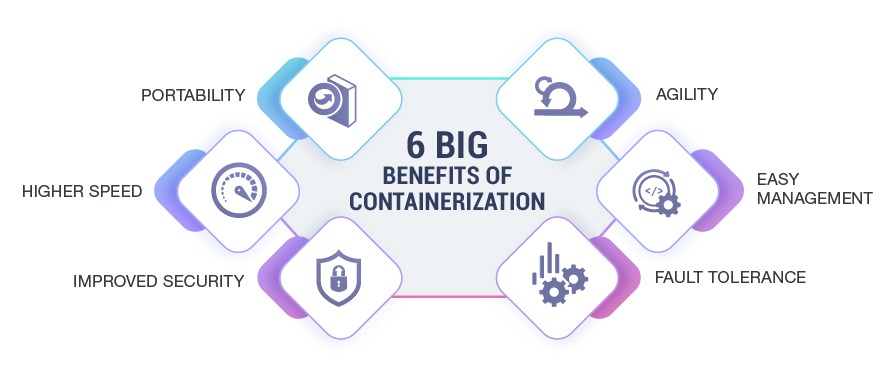
Benefits of Containerization: Why Businesses Should Consider it?
23 Nov 2021
Containerization has become a major buzzword in cloud computing. Considered as a natural evolution of virtualization, it is much more granular and flexible while breaking down the operating system into chunks for efficient usage. Application containerization helps enterprises to modernize legacy applications and create new & scalable cloud-native applications, faster.
Today, most enterprises are either already in the process of developing cloud-native applications based on containerization or are already going away from their existing monoliths into containers. All of this is to gain benefits provided by the containerization architecture. So, which one are you?
Through this blog, we’ll explore the essentials of containerization and how it can make the deployment of your apps faster and more effective.
Here’s What We’ll Cover:
Why Containerize Applications?
Today’s state-of-the-art software development requires modern infrastructure. To meet these ever-changing needs, several organizations are modernizing their multi-faceted IT environments with containerized cloud-native solutions.
Organizations, both large and small, turn to containers as a means to improve the application life-cycle management through capabilities such as continuous integration and continuous delivery. In certain types of implementation, they do confer to the principles of open-source, which appeals to organizations who are wary of being locked into a specific vendor.
Fundamentally, containers help to satisfy three key use cases (as listed below) to highlight what enterprises require to run their applications in the cloud:
- Modernize existing applications
- Creation of new cloud-native enterprise applications
- Seamless integration of data center with cloud services
Container Adoption is Growing Rapidly!
Gartner forecasts that by 2022, more than 75% of organizations worldwide will be running containerized applications in production.
Key Benefits of Containerization

Portability – Write Once, Run Anywhere
- Containers are executable software packages that bundle and carry all dependencies with them.
- The abstraction offered makes the container works consistently and uniformly regardless of the platform deployed.
- The containerized application can be run on different types of infrastructure- the cloud, even within virtual machines (VMs), or go directly to a bare metal server with minimal hassle.
Higher Speed – Faster Delivery
- Containers are often termed lightweight packages as they share the host machine’s OS kernel. This eliminates the need for a full operating system/application and makes container files small with fewer resources.
- The lightweight design ensures that developers can swiftly release new software, fix bugs, and upgrade new features. This often leads to a faster development process and speed up a time to market as well as operational tasks.
Improved Security – Prevent Attackers from Gaining Access
- As containers can work in complete isolation from one another, they offer a higher degree of security.
- Prevents the invasion of malicious code from affecting any of the other containers or the host system.
- Helps define specific security permissions to automatically block access of unwanted components by refraining their movement and restricting communications with unnecessary resources.
More Agile – DevOps oriented Software Development
- It is easy to set up containers compared to VMs irrespective of OS – UNIX or Windows.
- The essential developer tools are universal and user-friendly and aid speedy development, packaging, and implementation of containerized applications across the various OS.
- Developers can leverage DevOps best practices along with technology and tools to automate the process of coordinating, managing, scaling, and removing containers.
Easy Management – Install, Upgrade & Rollback Processes
- The container orchestration tools such as Kubernetes simplify application management. It mechanizes the deployment, scaling, and managing of containerized workloads and services.
- The applications are comparatively easier to manage, monitor, make version updates, and troubleshoot than traditional methods.
Fault Tolerance – Continuity in Operations
- Containers operate independently of each other. So, the failure of one does not impact the continuity over the chain.
- Developers can quickly identify and rectify errors within a faulty container while the others still keep running. This reduces downtime.
Wish to Spin-Off Your App Quicker Than Ever?
Leverage the power of containerization with us to deliver applications with higher efficiency regardless of your deployment environment.
Top DevOps Container Tools
Kubernetes
- An open-source platform, built by Google, is now maintained by the Cloud Native Computing Foundation. It is one of the most commonly used containerization tools in DevOps.
- Supports both declarative configuration and automation. It helps streamline deployment, scaling, and management of containerized workload and services.
Features:
- Load balancing & service discovery
- Storage orchestration
- Secret and configuration management
- Automated rollouts, rollbacks
OpenShift
- Built on the foundation of Red Hat’s Enterprise Linux and Kubernetes engine, it is a Platform as a Service (PaaS) solution.
- Offers out-of-the-box components for container management and orchestration. This is along with core Kubernetes features.
Features:
- CI/CD and Repositories
- OpenShift Monitoring and Logging
- Built-in Security Context Constraint (SSC)
- Role-based access control (RBAC)
- Hybrid OpenShift Architecture
Docker Swarm
- Uses a declarative model and provides the flexibility to define the desired state of service while maintaining the said state.
- A native clustering solution that turns multiple Docker host machines into a single, virtual host.
Features:
- Multi-host networking
- Decentralized design
- Declarative service model
- Cluster management integrated with Docker Engine
- Flexibility to scale the number of containers
Nomad
- A reliable, flexible, and easy-to-use workload orchestrator from Hashicorp to manage and deploy containers and non-containerized applications.
- Supported on macOS, Windows, Linux.
Features:
- Modernize Legacy Applications without Rewrite
- Easy Federation at Scale
- Proven Scalability
- Verified Connectivity
- Multi-Cloud with Ease
Marathon
- An open-source cluster manager tool designed specifically to manage containers.
- Provides the ability to scale container infrastructure by automating most of the management and monitoring tasks.
Features:
- Stateful Apps
- Health Checks
- Event Subscription
- REST APIs
- Service Discovery & Load Balancing
Rancher
- An open-source container orchestration tool that enables developers to leverage services such as Kubernetes, Swarm, Mesos.
- Provides the software required to manage containers. So, it removes the need to build container services platforms from scratch.
Features:
- Centralized Cluster Provisioning supports on-prem, cloud, and edge
- Cross-host networking
- Load Balancing
- Service discovery and upgrades
- Multi-tenancy & user management
Use Cases for Containers
Now that we’ve looked at the core concept, its benefits, and more, let’s have a look at some important use cases where IT companies are utilizing this technology.
- Microservices: Being extremely lightweight they are highly suitable for architectures where complex applications can be easily isolated, deployed, and scaled.
- Containers as a service (CaaS): It allows container-based virtualization where container engines, orchestration, and the fundamental compute resources are delivered as a service from a cloud provider. This simplifies the development process and enables DevOps teams to deploy applications quicker with CI/CD pipeline automation.
- Hybrid & Multi-cloud: Provide improved portability and flexibility as they can run uniformly anywhere, irrespective of the platform – bare metal servers, on-premises, and cloud environments. This makes it perfect for multi-cloud and hybrid platforms where IT enterprises operate across a mix of several public clouds in combination with their own data center.
- IoT Devices: A major catalyst to install and update applications. Sensor-specific libraries can be encapsulated with the application in a container, which provides app portability across devices.
- Lift and Shift Migrations: This approach involves quick modernization of applications with minimal or no redesigning or modification in existing code. Containers are one of the preferable options for most organizations as it simplifies the deployment process.
Concluding Thoughts
In recent years, containerization has witnessed widespread adoption in software development by IT enterprises worldwide. With correct application, it can increase the efficiency of DevOps; accelerate deployment, streamline workflows, and minimize infrastructure conflicts. Further, containers offer an efficient way for the development teams to build, test and deploy, applications on multiple environments from on-premises data centers to the cloud. They take advantage of virtually all of the available computing resources and would require almost no overhead to operate.
At Rishabh, we foresee the phenomenal use of containerization in the future as applications continue to grow in complexity. We can help you start your cloud journey with the right containerization strategy, or perhaps even discuss your progress to date while improving your existing IT infrastructure. Further, we can help you navigate containers and microservices. As an experienced software development company, we provide world-class DevOps solutions and services with our objective to accelerate digital transformation for growing companies. It’s time for you to embark on a container strategy, or you may miss the boat.
Drive Agility with Container-Based Environments
As your tech partner, we help you unlock the benefits of containerization with both in the cloud and on-premise container orchestration





